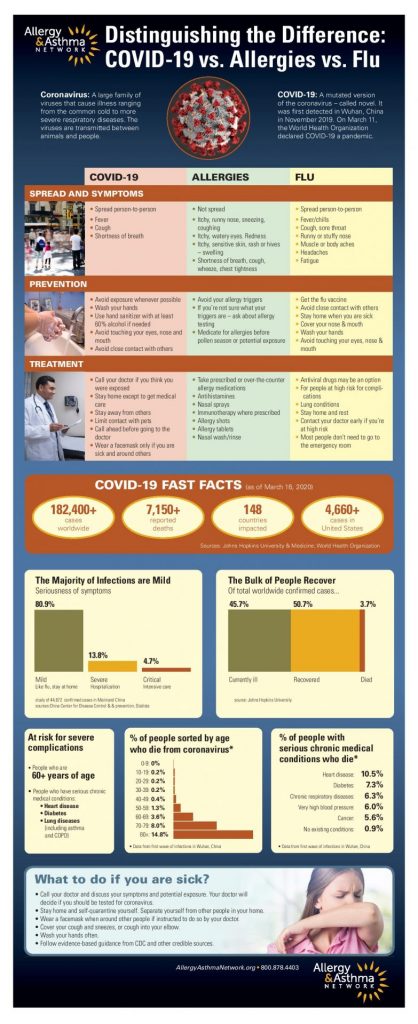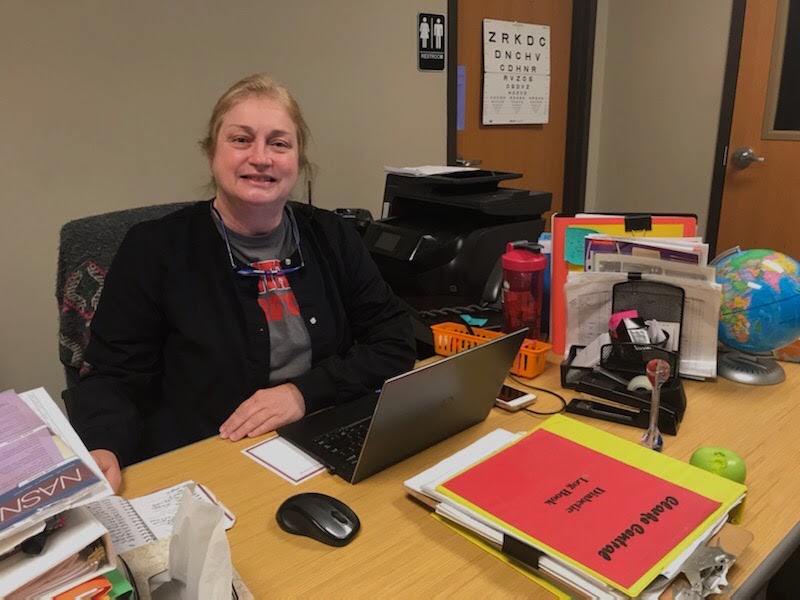Clarke Central High School nurse Iveta Rabb sits in her office on May 13, 2019. With the closure of all Georgia public schools until April 24 in order to contain COVID-19, Rabb hopes students will maintain healthy habits while out. “Something to help you keep well is to keep your hands away from your face. Because our faces are the portals into our body. You know we’ve got our eyes, our nose, our mouth, mucous membranes,” Rabb said. “And that’s where the virus is going to get in, so it’s very easily transmissible because of the way it’s spread.” Photo by Audrey Enghauser
Clarke Central High School nurse Iveta Rabb discusses how students and their families can deal with different situations that may arise with their health while out of school due to COVID-19.
News staffer Isabella Johnson: What are some things that students should be doing regularly, year-round to avoid getting sick?
Clarke Central High School nurse Iveta Rabb: Well, I think the old basic health care behaviors are essential for all of us, not just students. That’s things like getting enough rest — lack of sleep affects your immune system. Another common thing is eating properly, getting proper nutrition in your body, and most Americans have a hard time consuming a balanced diet. So, if that seems to be a problem, we should be taking some sort of nutritional supplement, like a multivitamin. I would say that that’s not the best way to get nutrition, (but) eating a really good diet is expensive. It’s hard for a lot of our students, our families, to do that. So rest, nutrition, hydration. Most of our bodies (are made of) water, at least 60%, and many of us just don’t drink enough fluid. At this time looking at the coronavirus and thinking that one of our first lines of defense are our mucous membranes, we should be hydrating and keeping them very moist. You know you’re drinking enough water if when you urinate, or pee, the urine looks almost like water, (but) most people just don’t drink enough.
“Well, I think the old basic health care behaviors are essential for all of us, not just students.”
— Iveta Rabb,
CCHS nurse
IJ: Some people have said, connected with not catching COVID-19, it is important to wash our hands more. Could you describe an ideal hand wash?
IR: There are so many examples of that on YouTube and Instagram and other social media. But it’s washing your hands with soap and water for about 20 seconds. That’s hard to do. Most of us don’t do that. Even when they did a study of nurses in the hospital, they found that a lot of nurses aren’t even doing that and that’s just not acceptable. So, you have to wash all surfaces. Make sure you get around the fingernails and under the nails. Don’t forget your thumb. It’s better to use warm water than cold but if you don’t have warm water, at least just use water, getting a lot of lather and rinsing well.
IJ: When kids do get sick, how should they take care of themselves in a way that avoids spreading it to other people?
IR: Well, these are also the old health standby rules, (such as) coughing into your sleeves, not into your hands if you can help it. If you cough into your hands, you need to wash your hands, or cough into a tissue but even then you have to throw away the tissue right away and then wash your hands. You can social distance, which is a big thing that (health officials) are pushing now. There’s a lot to that because (COVID-19 is) a droplet infection, and that means that the virus gets (in) little droplets that you can’t even see. So when you cough or sneeze, it goes out from your body, about four to six feet. So you should try to keep yourself away from others.
“You can social distance, which is a big thing that (health officials) are pushing now. There’s a lot to that because (COVID-19 is) a droplet infection, and that means that the virus gets (in) little droplets that you can’t even see.”
— Iveta Rabb,
CCHS nurse
IJ: If someone suspects that a relative has COVID-19, what would you recommend for them to do?
IR: It depends on how sick they are. In general, people (will) know they have it if they have minimal symptoms, (or) even moderate, they may be guided by their healthcare provider to stay at home and shelter at home and only come in or call if it becomes severe. So any kind of supportive measures you can do, say somebody has COVID-19, and they’re in the house, then they’re going to probably be in a bedroom someplace away from everybody else.
IJ: How else could this affect students during the time at home?

A poster displays differences between COVID-19, allergies and the flu along with facts about COVID-19. Clarke Central High School nurse Iveta Rabb thinks Americans should be educated about risks associated with the pandemic. “(COVID-19) remains in the body of many (who) are asymptomatic so that means you don’t have any symptoms. So, if you have a bunch of people walking around and they think they’re healthy, they think they’re fine, (but) they don’t know they’re carrying a virus, they might cough or sneeze, no big deal. They don’t wash their hands. They don’t cough into their sleeve. They touch surfaces.” Photo fair use of the Allergy and Asthma Network.
IR: All of a sudden, (students in this situation are) going to be doing a lot more of that type of parenting. And that might not be what you want, you might be trying to think, “Well, how am I going to do all this and get my assignments done? When I really don’t even want to do that.” I don’t know exactly what to recommend as far as that goes, other than doing your best to provide the support, and maybe turn to a good friend for help. If you have a good friend and the friend isn’t sick, maybe they can come over and help you watch those little ones or they can help somebody to talk to about it. Someone to just kind of be your buddy. Turning to one another, it’s just not overrated. It’s such an important thing right now.
IJ: Can you tell me about why this virus has spread so quickly?
IR: I already mentioned that it’s a droplet infection, and it remains in the body of many (who) are asymptomatic so that means you don’t have any symptoms. So, if you have a bunch of people walking around and they think they’re healthy, they think they’re fine, (but) they don’t know they’re carrying a virus, they might cough or sneeze, no big deal. They don’t wash their hands. They don’t cough into their sleeve. They touch surfaces. Somebody else comes by, they touch the same surface, (and then) they touch their face. Bam. That’s exactly how things spread so very easily is that people don’t know they are infected. And they cough or sneeze, they touch surfaces, they touch their faces. We touch our faces many many times a day without even thinking about it when we should really be keeping our hands away from our face. So it’s easily transmitted because of the way that we usually go through the day and aren’t really cognizant of the hygiene aspects of our lives. We’re not really paying attention. We’re spreading it around. Some people are symptomatic, and they’re still going to work or they’re going to school.
IJ: The school sent out a community letter and said that the school nurses are available. How are you accessible to kids while we’re out of school?
IR: Well, there’s email. I’ve already received several from (students. I even got) one from (a) student just saying, “hi”. The school is supposed to put out my phone number. I will be able to answer any questions that parents or students have, hopefully able to answer any questions and I’m actually calling in, contacting parents about medications that I have for kids at school, trying to find out if they need it at home. A lot of the nurses are volunteering to hand out meals to students because we have several locations where they’re providing breakfast and lunch meals for students. The parents and the student can come together and go to these sites.
